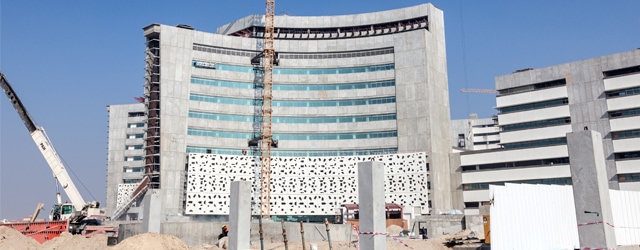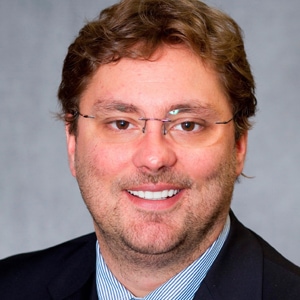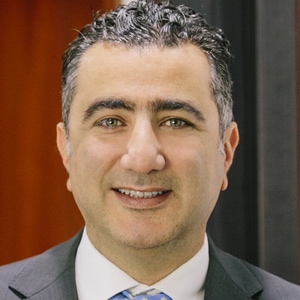Low oil prices are forcing the country to build up other sectors—most notably healthcare—to shore up its ability to weather economic storms.

Kuwait, not unlike its neighbors in the Gulf, is confronted with myriad economic challenges as low oil prices ravage government finances. Though fiscally well positioned, Kuwait has a crippling dependency on hydrocarbon income, which accounts for more than 90% of government revenues, according to credit rating agency Moody’s Investors Service. And although the emirate has accelerated diversification efforts, recent elections saw gains by candidates opposed to the government’s austerity drive. That could put a check on reforms.
The reforms are not just about broadening the economy; they are also about adapting to change. Analysts say the world’s oldest sovereign wealth fund, the Kuwait Investment Authority (KIA), may be reviewing its investment strategy following a groundbreaking deal between SoftBank and Saudi Arabia’s Public Investment Fund.The kingdom’s restructured sovereign wealth arm seeks to build a $100 billion fund with the Japanese tech firm—signaling a shift in focus by the erstwhile domestic fund. The move symbolizes the emergence of so-called sovereign venture funds that are investing in innovation and technology as they strive for alpha.
Sovereign wealth funds (SWFs) in the Gulf have typically gained exposure to the technology sector through venture capital partners in Silicon Valley, but KIA earlier contributed $10 million to a Series C funding round in Careem, a Middle Eastern rival of the ride-hailing app Uber. The investment was led by the Abraaj Group, a Dubai-based private equity firm. KIA is hoping Careem becomes a “unicorn”—a tech start-up that reaches a valuation of $1 billion. Still, it is unlikely KIA will invest in early-stage financing in the technology sector—simply because the amounts are often too small. Nevertheless, rumors persist that Kuwait might set up a venture fund.

What is more probable is that the SWFs’ interest in the financial sector will lead to investments in more-established financial technology. “We will likely see more late-stage capital injections into firms raising pre-IPO rounds of financing,” says Veljko Fotak, assistant professor of economics at the State University of New York at Buffalo and a fellow at the Baffi Carefin Sovereign Investment Lab. “SWFs have shown a love for financials, so perhaps some fintech unicorns could end up on the receiving end.”
Donald Trump’s election victory may weigh on the Kuwait Investment Authority’s strategy. KIA, with close to $600 billion in assets under management, has $300 billion invested in the US, according to recent reports. An asset manager who works on sovereign wealth fund mandates and who asked not to be identified due to client privilege said KIA is quickly facing up to a changing world amid increased volatility in global energy markets. Fotak is more sanguine: “Uncertainty connected to Mr. Trump’s victory might lead to marginal changes in allocations—with Asia-Pacific the likely beneficiary, rather than Europe—but these changes are unlikely to be significant.”
Meanwhile, construction continues to be the main beneficiary of infrastructure spending announced in the 2015–2020 Kuwait Development Plan (KDP), which includes projects totaling more than $100 billion and is expected to be the main driver of much-needed growth in the non-oil sector. According to Oxford Business Group, the plan targets non-oil growth of 5% to 6% in the next few years and commits to increasing public-private partnerships. Boosting industrial output is a key policy objective, with petrochemicals and plastics leading expansion. In August a joint venture between Dow Chemical and three local firms—Petrochemical Industries, Boubyan Petrochemical and Al Qurain Petrochemical Industries—announced plans to build a 200,000-square-meter industrial complex.
The Ministry of Commerce and Industry also announced in October that it had approved an application from Kuwait Petroleum to form a new subsidiary, Kuwait Integrated Petrochemical Industries, for refinery and petrochemicals projects. The company, with purportedly $6 billion of capital, is expected to focus on downstream projects, Oxford Business Group says. Additionally, Kuwait is investing heavily in industrial zones, including the 160 million Kuwaiti dinars ($525 million) Al-Naayem Industrial Zone, launched by the Public Authority for Industry last year. The PAI says Kuwait intends to boost industrial output by 25% in the coming years. In a bid to attract greater foreign direct investment, regulations have been amended to allow 100% foreign ownership in certain sectors.
Elsewhere, Kuwait is on track to open the Middle East’s biggest hospital (sixth-largest in the world) as part of efforts to overhaul the healthcare sector that could create one of the world’s most efficient healthcare systems. The $1 billion, 270,000-square-foot Jaber Al-Ahmad Al-Jaber Al-Sabah Hospital project is a bid to seek competitive advantage in key sectors. Indeed the 2015–2020 KDP singles out healthcare as a top government priority, mandating the Ministry of Health to both improve services and reduce costs in a field where it once held leadership.

Nicos Savva, associate professor of management science and operations at London Business School, argues Kuwait’s healthcare goals are supported by the $4.2 billion portion of the development plan that includes construction of nine additional hospitals and creation of 15,000 new jobs. Even so, Kuwait’s healthcare sector can only become a key pillar of the economy if policymakers prioritize industry specialization, he claims.
“Kuwait should invest in two types of facilities,” Savva explains, “large emergency hospitals that treat complex patients whose conditions need immediate attention, and focused, single-service-line units that offer selective care.” It is not alone in attempting to develop the sector. Dubai has revamped Healthcare City as it tries to emulate the healthcare tourism franchise Singapore created.
Though commendable, Kuwait’s ambitions to diversify the economy may yet founder. Critics of the government won 24 out of 50 contested seats in November’s elections, with voter turnout around 70%—the highest level on record since the 1990s. Opposition to austerity measures, particularly cuts in fuel subsidies, has been intense, forcing the government to roll back some reforms. Tariq Qaqish, managing director of asset management at Al Mal Capital in Dubai believes there will be a mismatch between what the Kuwaiti government wants to achieve and what the new parliament will permit: “The government will be focusing on reducing fiscal pressure, [but] the new parliament will continue to support populist reforms.”
But Steffen Dyck, Moody’s lead analyst for Kuwait, believes momentum from budget expenditure will continue to buoy the economy in the short term. “In contrast to the poor execution of the previous five-year National Development Plan,” he says, “indicators point to improved budget execution this time, with total amount of projects awarded throughout the first three quarters of the year reaching $12 billion.” Even so, Moody’s concedes the “credit-negative” election results could hamper reforms.



